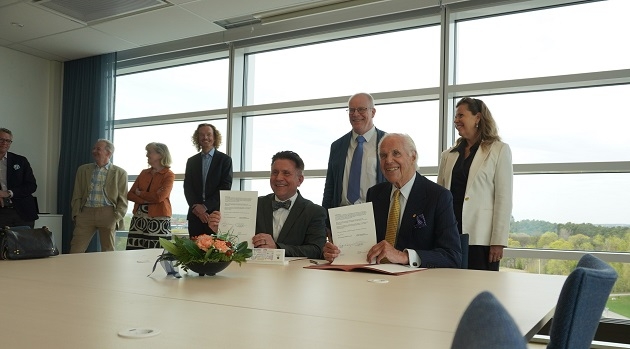Inauguration of the Beijer Artificial Intelligence Laboratory

Vice-rector Johan Tysk and Chair of the Beijer Foundation Anders Wall with the agreement on the new Beijer Artificial Intelligence Laboratory.
Earlier in May, the Beijer Artificial Intelligence Laboratory was inaugurated in Building 10 of the Ångström Laboratory. The lab will focus its research on the applications of AI in the life sciences and on AI’s societal impact.
The first Beijer Laboratory at the Faculty of Science and Technology was made possible by a donation from Kjell and Märta Beijer Foundation. The lab will be led by the Beijer professor of artificial intelligence. This position has been held by Thomas Schön since 2020. The funding provided by the Beijer Foundation amounts to SEK 2.6 million per year for 5 years. However, there are strong possibilities of permanent support, as is the case for two other Beijer science labs in the fields of medicine and pharmacy and one at SLU.
Anders Wall, chair of the Beijer Foundation, Cecilia Wikström, director of the foundation and Anders Hagfeldt, Vice-Chancellor of Uppsala University, were present at the inauguration on 10 May at the Ångström Laboratory. Johan Tysk, Vice-rector of the Disciplinary Domain of Science and Technology, thanked the Beijer Foundation for investing in the new lab, which means a lot both to the faculty and the university.
Overall impact
“We’re pleased that the Beijer Foundation wishes to conduct artificial intelligence research with a focus on life sciences, as well as social science problems and opportunities. As I see them, these are extremely interesting research areas, but at the same time these are things I think we’ll all notice and be affected by in our daily lives,” said Johan Tysk.
Since 2020, the Carolina Rediviva University Library has also been host to a five-year research project called AI4Research, in which researchers from across the university can gather to develop their research areas with the help of AI. The project’s scientific leader is Beijer professor Thomas Schön, who spoke about what inspires his research.
“Either it should be the absolute best basic research or it should be about using it in ways that are relevant to society. For me, it’s very important to be able to see how algorithms can actually be used to solve real-world problems, and then to be able to channel this so we know what type of basic research we’re going to be working with.”
A broad spectrum of collaboration
The agreement between the Beijer Foundation and the Faculty of Science and Technology was then signed. According to Anders Wall, this was the most exciting project he has seen so far, because it includes so many areas.
“I’m also very happy that we have a place in Carolina Rediviva, and we also have access not only to the education and development that takes place in Building 10 of the Ångström Laboratory, but also a relationship with other faculties and other people within the university."
Anneli Björkman
FACTS ABOUT THE BEIJER ARTIFICIAL INTELLIGENCE LABORATORY
The new Beijer Artificial Intelligence Laboratory in Building 10 of the Ångström Laboratory is funded by the Kjell and Märta Beijer Foundation. The Beijer Laboratory aims to create a new, unique people-centred engineering discipline with a focus on two fields of science:
- AI with a focus on research applied to the life sciences
- AI with a focus on research into its societal impacts
Two people will be employed under the name “Beijer researchers” and will receive SEK 2.6 million in funding per year for 5 years, with the possibility of extension.
In 1990, a donation from the Beijer Foundation laid the foundation for the Beijer Laboratory for Genome Research at Uppsala University. In 2013, the foundation awarded funding to two more research fields at Uppsala University and the Swedish University of Agricultural Sciences (SLU). Today, these are known by the names Beijer Laboratories for Genetic Research and Neuroscience, Pharmaceutical Research and Animal Research.
